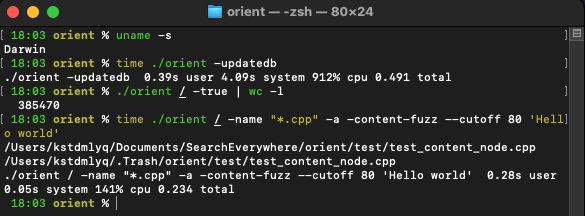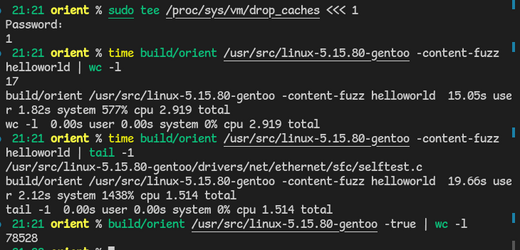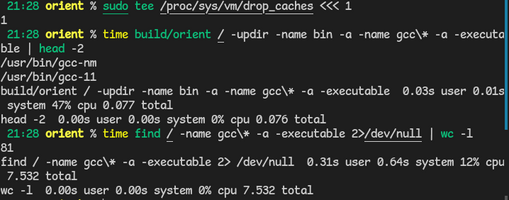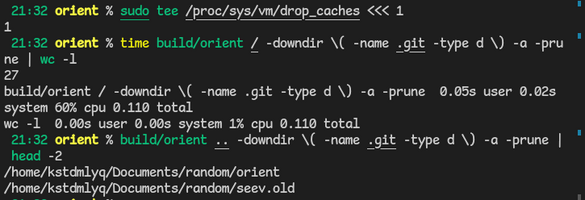A cross-platform filesystem indexer and searcher combining the merits of
find, locate and Everything, plus file content searches.
Works on Linux, macOS and Windows.
Inverted index, the tech behind plocate which make searches done in
near-constant time, is implemented in v0.4.0 and above. Unfortunately
v0.4 is not well tested, and the release is currently v0.3.x. Also, all
demostrations in the README are done on v0.3.0.
For personal computers which usually have less than 3M files, inverted index
does not make too much of a difference though.
Content searches are not indexed. Indexing file content indexing
will be worked on if this repo reached 512 stars, so smash that star
button if the app proves useful for you or if you find it interesting!
(More about this here.)
This README is about the CLI application. For GUI frontend, see SearchEverywhere. (also quite unstable)
This project started being worked on since August 2022, but was not published
until April 2023 due to countless bugs. There may still be countless bugs
currently though, even on stable version (v0.3.x).
The only runtime dependency is PCRE2, and a fully static executable is only 2.5MiB in size (stripped).
The First Libre File Indexer Ever on macOS and Windows!😜
- Ignores macOS firmlink
/System/Volumes/Datawhich tricksfind - Using native UTF-16 on Windows with minimal modification to code (via templates), achieving both performance and simplicity
- Handles Windows drives as if they were Unix directories (with '\' being separator of course)
Screenshot on macOS and Windows respectively:


Unlike locate, rebuild filesystem index requires NO root permission
(or Administrator on Windows). No setugid either.
For SSDs, a thread pool is set up for concurrent directory reads,
drastically speeding up read speed.
For HDDs, this feature shall be disabled, as multithreaded IO gives no
visible performance gains due to their spinning nature.
Whether multithreaded updatedb shall be enabled can be toggled per path.
The figure shows that orient can scan 810000 files within 1 secs with
cache dropped, but the disk used is a rather high-end one. Take it with
a grain of salt though.

Like updatedb, the same thread pool is also used for content match.
Fuzzy matching hello world from the 75000-file Linux kernel source
tree took 5.5secs when cache dropped and 1.5secs with cache.

(take with a grain of salt; 16x Intel i7 11800H and NVMe SSD)
On Windows content matching is significantly slower, a combined effect of UTF8 to UTF16 conversion, lack of efficient kernel memory mapping (
mmap(2)) and the bloated, inefficient nature of Windows.
Goodbye find ... | xargs grep ... and find ... -a -exec grep ...
As shown below, orient also implements large portions of find's
matches, making users easy to familierze themselves with existing
experience in using find while also increasing the app's versatility.

Unlike Everything which hard code parent match to string matching only,
in orient, -updir -downdir can be applied to any predicate.
Also -downdir is almost 0 overhead and -updir make searches even
faster by caching recent matches.
Matching Parent:

Matching Children:

| Linux | Windows | macOS | Android | License | |
|---|---|---|---|---|---|
Everything |
👎NO | 👍YES | 👎NO | 👎NO | Proprietary |
find |
👍YES | 👎NO | 👎NO | 👎NO | GPLv3 |
fsearch |
👍YES | 👎NO | 👎NO | 👎NO | GPLv2 |
locate |
👍YES | 👎NO | 👎NO | 👎NO | GPLv3 |
orient |
👍YES | 👍YES | 👍YES | 👎NO | GPLv3 |
Continued Table
-and -or |
Invert Index | Match Parent | GUI | CLI | |
|---|---|---|---|---|---|
Everything |
👍YES | 👎NO | Partial | 👍YES | 😕 |
find |
👍YES | 👎NO | 👎NO | 👎NO | 👍YES |
fsearch |
👍YES | 👎NO | Partial | 👍YES | 👎NO |
locate |
👎NO | 👍YES | 👎NO | 👎NO | 👍YES |
orient |
👍YES | 👍YES | 👍YES | 👍YES | 👍YES |
Notes:
- Partially matching parent and children means while they do provide options to match a file's parent or dir's children, such searches are confined to string matches instead of all the app's features.
EverythingCLI seems to have all results prettified, making it very hard to use in combination with other tools, hence the 😕 face.eVeRyThInGiS pRoPrIeTaRy, OnLy SdK pRoViDeD!!! OuR dEaR lEaDeR rIcHaRd StAlLmAn WiLl NuKe it!!!What's worse,
Everything SDKis filled with global states.🤮
Users who are familiar with find could jumpstart with orient's find
compatible predicates, like -regex, -lname, -okdir and others.
Note that orient predicates are sometimes superset of their find
counterparts, like -quit optionally accepts a integer argument meaning
how many results can be produced before quitting. Its default value is 1
so that when using -quit with no arguments it has no difference from
that in find.
For predicates specific to orient, only orient-style syntax is
provided, see below.
# mp3 or mp4 file excluding under hidden dirs
find ~ \( -name ".*" -a -prune -a -false \) -o -name "*.mp[34]"
orient ~ \( -name ".*" -a -prune -a -false \) -o -name "*.mp[34]"
# Ask user to whether to show its realpath when a symlink found in /usr
# until user inputs "yes" (realpath executes)
find /usr -type l -a -okdir realpath \{\} \; -a -quit
orient /usr -type l -a -okdir realpath \{\} \; -a -quit
# Until 2 user inputs "yes"
orient /usr -type l -a -okdir realpath \{\} \; -a -quit 2
# Even better, -quitmod
orient /usr -quitmod \( -type l -a -okdir realpath \{\} \; \)
# -quit -quitmod has some quirks; see docs/predicates.mdorient does not have as much (unique) predicates as find. Instead,
orient use -PRED --ARG syntax, giving multiple matching schemes to
a single predicate, boosting code reuseability.
- Path match predicates:
-name-bregex-strstr-fuzz
Arguments:--ignore-case(except-fuzz)--full--readlink - Content match predicates:
-content-{strstr,fuzz,regex}
Arguments:--ignore-case(except fuzz)--blocked--allow-binary - File stat predicates:
-size-{a,m,c}{time,min}-inum
Arguments: File name or integer prefixed by+or- - and more...
Many find compatible predicates are actually aliases, like
-lname is identical to -name --readlink
-regex - -bregex --ignore-case (the b stands for basename)
-samefile is basically -inode since -inode also accepts filename
It is also possible to mix two syntaxes together, though unrecommended
like-iname --fullor-anewer +5
Below are some simple examples. See more on how to use them here.
# Find C source files containing "hello"; orient style only
orient / -content-strstr hello -name "*.c"
# Many `find` style predicates are actually aliases, ex:
orient / -iname "*.cpp" # find style
orient / -name --ignore-case "*.cpp" # orient style
# Assuming /home/a/b links to /var/tmp, then
# all the following 3 lines matches /home/a/b
# `-lname` is identical to `-name --readlink`
orient / -lname "*tmp"
orient / -name --readlink "*tmp"
# `orient` style is more versatile:
orient / -bregex --readlink 'tmp$' # No `find` style alternativeWith the introduction of modifier predicates, it is possible to "do
something" before propagating to other preds, which is exactly what
-updir and -downdir does: they match the parent of files and
children of directories.
With modifiers, -updir -downdir can be applied to any predicate
in orient, unlike Everything which hard code parent match to string
matching only.
Any predicate includes recursive use of -updir -downdir themselves.
Also -downdir is almost 0 overhead and -updir make searches even
faster by caching recent matches.
Some more modifiers include -prunemod, -quitmod and -not. Ex:
# Find bin/gcc*
orient / -updir -name "gcc*" -a -executable
# Find bin/gcc* or bin/clang*
orient / -updir \( -name "gcc*" -o -name "clang*" \) -a -executable
# Find git repositories, first level only
orient / -downdir \( -name .git -a -type d \) -a -prune
# Must use -exec test on find and is extremely slow
find .. -type d -a -exec test -d '{}/.git' \; -a -print -a -prune
# .cc files under src directory of a git repository
orient / -updir \( -name src -a -updir -downdir -name .git \) -name "*.cc"Since the application is a CLI, simply grab the executable of your system and it should work.
On Linux,
-user -nouser -group -nogrouprequire glibc to work.
Unfortunately the macOS ARM version is missing since I don't have one such machine🫥. Feel free to report whether it works on issue or discussion.
Currently this app is too little-tested to release to a distribution.
May release to Arch AUR first btw.
Building from source is recommended in the early stage of release.
Give it a shot! (Required for v0.4.0)
Or even better, build both orient and
SearchEverywhere.
By building SearchEverywhere, orient also gets built.
Build dependencies:
- CMake
- PCRE2
- rapidfuzz
- GoogleTest (Test Only)
Aside from CMake, all dependency can be auto-downloaded by CMake.
Using an installed one is also possible, should you have already
installed some of them onto your system, via toggling these configure
options below.
Configure Options:
ORIE_TEST: Build GoogleTest test suitesORIE_SYSTEM_PCRE2: Use System PCRE2 Library instead of compiling a new one.ORIE_LINK_STATIC: Statically link orient executableORIE_SYSTEM_RAPIDFUZZ: Use System rapidfuzz Library (header only)
Replace the OPTION below with your enabled options, and run the
following commands:
git clone https://github.com/cxxsucks/orient.git
cd orient; mkdir build; cd build
cmake -DOPTION1=ON -DOPTION2=ON -DCMAKE_BUILD_TYPE=Release ..
make -j$(nproc)
sudo make installDefault config generation hard-codes some starting points and enables
multithreaded read on all of them, which is suboptimal for rotational
hard disks.
If you happen to use HDDs, do the following the first time running orient:
- Run
orient -updatedb - Immediately interrupt with
Ctrl-C - Open
~/.config/orie/default.txtor%APPDATA%\.orie\default.txt - Review the paths succeeding
ROOT, remove theSSDfield if any of these paths are actually not on SSD. - If there are any HDD root paths not listed, write
ROOT "/path/to/mountpoint"or simply do not index it withIGNORED "/path/to/mountpoint".
On Linux, /sys/block/sda/queue/rotational provide insights on whether
a disk is rotational, which macOS and Windows unfortunately (but
expectedly) do not have.
In a future release root points will be aquired from /etc/mtab and
/sys/.../rotational, which auto-configure root paths on Linux and macOS.
ApPlE iS sO cOoL! tHeY mUsT hAvE eQuIpPeD tHeIr MaCbOoKs WiTh ThE bEsT hArD dIsKs In ThE wOrLd AnD iS dEfInItElY nOt RoTaTiOnAl!
The exec series of predicates are implemented, but not tested, on Windows.
And a moderate amount of software engineering experience would tell that
untested features would certainly contain errors, if not fail outright.
There are a number of untested features, with exec on Windows being the
only one actually listed in feature list.
Other untested features are listed in TODO list, but not
feature list, along with reasons why they are not tested.
Mostly global options:
-context(SELinux context)-printf -fprintf -ls -fls(Format print)-newerXY-mindepth-maxdepth-H -L -P(symlink following global options)-D(debugopts)-O(optimize level)orienthas its own optimizer similar tofind -O3-regextype(hardcoded PCRE2)-warn -nowarn-d -depth(depth first search)orientcan only search according to index.-deleteis not affected though, unlikefind.-files0-from-mount -xdev -xautofs(do not descend into mounts)-help -version
Documentations would be the center of works recently.
Bug reports and feature request are still accepted anyway, in GitHub Issues
Tracker of this repository.
See TODO List for details.
- dirent: Unix
direntport to WindowsHeavily modified here for symlink and (fake) device, socket support, therefore it is directly placed into source instead of module.
- PCRE2 Regular Expression
- rapidfuzz-cpp: Header Only Fuzzy string matching library